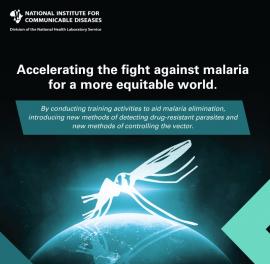
The National Institute for Communicable Diseases (NICD) said it was forging ahead with supporting the national Department of Health to eliminate locally acquired malaria in South Africa through several activities.
According to the NICD, Africa bears more than 90% of the global malaria burden, with one child dying every minute from malaria – a preventable and treatable disease.
Each year on April 25, the NICD joins the global community in recognising World Malaria Day.
This year’s theme will focus on ‘Accelerating the fight against malaria for a more equitable world’.
The NICD said that in South Africa, cases of malaria are associated either with local transmission of the malaria parasite in areas of the Limpopo, Mpumalanga and KwaZulu-Natal provinces, or exposure to malaria parasites in travellers to other endemic regions returning to South Africa.
According to a report on malaria case trends based on notifications captured through the Notifiable Medical Conditions Surveillance System (NMC-SS) from September 2022 to August 2023, the majority of malaria cases in South Africa came from the malaria-endemic province of Limpopo.
Data reveals that 5 813 cases were recorded of which 2 845 were logged in Limpopo.
Meanwhile, Gauteng reported the second-highest number of cases, all of which were associated with imported malaria.
In contrast, the national public health institute said KwaZulu-Natal reported the lowest number of infections sitting at 424 among the endemic provinces.
“In KwaZulu-Natal, nearly all of the cases reported were imported cases, supporting claims that the province is edging closer to halting local transmission of malaria,” the NICD explained.
As per the NICD, peaks in malaria notifications typically follow periods of increased national and international travel to malaria-endemic regions.
Data also shows that economically active young males, especially those aged between 20 and 39 years, appeared to be the most at risk population group, a trend observed in other low transmission areas.
“These findings emphasise the importance of targeting young males with messaging during major holidays and strengthening malaria test-and-treat activities along shared international borders.”
The NICD’s Centre for Emerging Zoonotic and Parasitic Diseases supports the National Department of Health in eradicating locally acquired malaria through several activities.
These include contributing to malaria surveillance for accurate monitoring of the occurrence of malaria in South Africa and providing technical support to provincial malaria control programmes.
The centre monitors insecticide resistance in malaria mosquitoes, screens for antimalarial drug and diagnostic resistance, teaches and trains on various aspects of malaria, and supports improved quality control for laboratory testing for malaria.
The team also leads innovative research, including investigating novel ways to control malaria mosquitoes and assessing the impact of environmental pollutants on malaria mosquitoes lifecycles and their ability to transmit malaria parasites.
Frequently asked questions (FAQs) and further information on malaria prevention is available on the NICD website www.nicd.ac.za. – SAnews.gov.za


